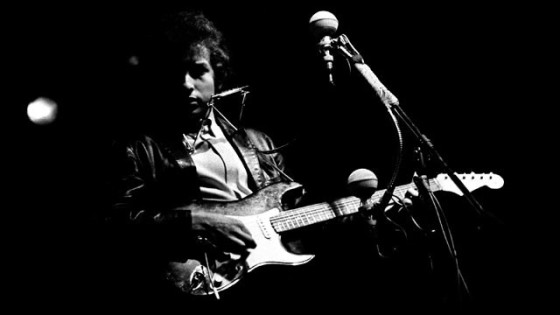By July of 1965 Bob Dylan had become a significant cultural icon. He was a voice for the unrest and the angst of a whole generation. His melodies and verse put powerful feelings into words. And never forget, words are the things that influence others and spread ideas and bring meaningful change.
But Bob Dylan loved Elvis and rock and roll music was drawing him away from the folk music (and the folk fans) that had made him famous.
Times they were a-changing and Dylan was making the change whether his tribe followed him or not. First of all, in July of 1965, at the height of his folk popularity Dylan released his first rock album “Like a Rolling Stone.” Then just a few days after the album’s release he appeared on stage at the Newport Folk Festival …with an electric guitar and a rock band and was almost booed off the stage. Times are changing indeed.
Dylan said, “When I first heard Elvis’s voice, I just knew that I wasn’t going to work for anybody and nobody was gonna be my boss. Hearing him for the first time was like busting out of jail.”
When I think about Dylan and the influence Elvis had on him I can think of at least three things Dylan can teach us about bold change.
- Dylan heard Elvis and it inspired him to change. Most people listen to music and like the beat or the melody or they just like the way it sounds. But Elvis’s voice touched some latent seed of destiny that hadn’t yet awakened in him. When he heard the music, he took the red pill. He knew he was going to have to change or be miserable the rest of his life. Have you heard a song or a sermon or read a book that makes you feel like you’re “busting out of jail?”
- Real change doesn’t happen in little timid shuffling steps. Lasting change happens in big bold steps. Dylan didn’t just think about changing his style of music, he moved out boldly and did a whole new album! I can only imagine how many battles he had to fight to make that happen. And then, as if that weren’t enough, he had the boldness to take the stage at Newport armed with an electric guitar. There’s no turning back when you’re committed to change like that.
- The more you care about your art and your calling the less you’ll care about the criticism of others. Changing from a folk music career to a rock career at a big folk music festival with lots of exposure and lots of risk is not the move of a timid man concerned about criticism. It’s easy now to look back on this incident as just one more step in the long and diverse creative career of a very talented artist. But I’m sure there was a gut-check moment when Dylan’s foot was on the first step leading up to the stage when he heard the voice, “This might not work” but he went anyway. He cared more about his art than he did the boos of that crowd.
What is the change you know is on your horizon? Any step of change worth taking is worth taking boldly…even in the face of criticism.
Are you ready to take the stage?





















Recent Comments